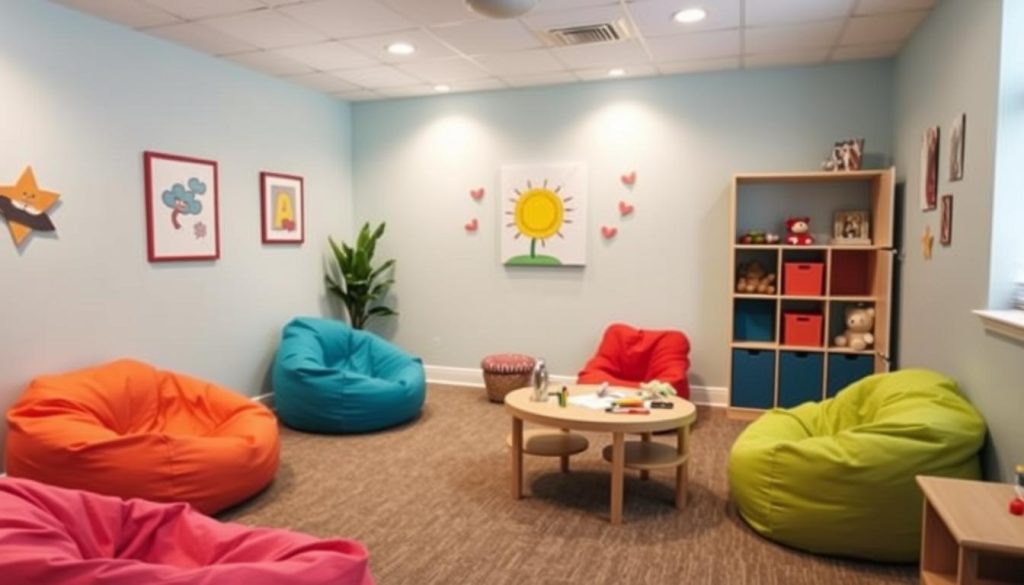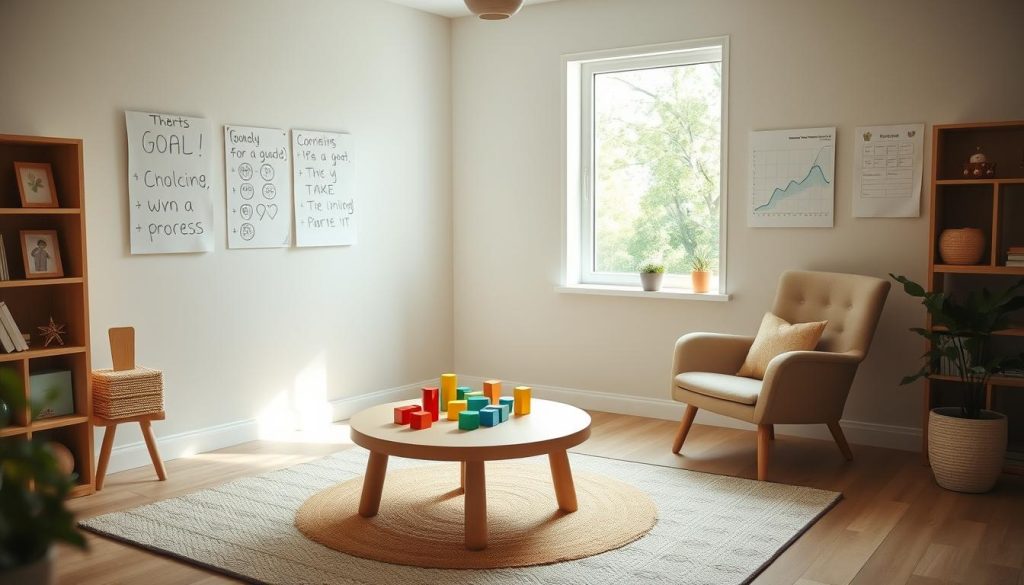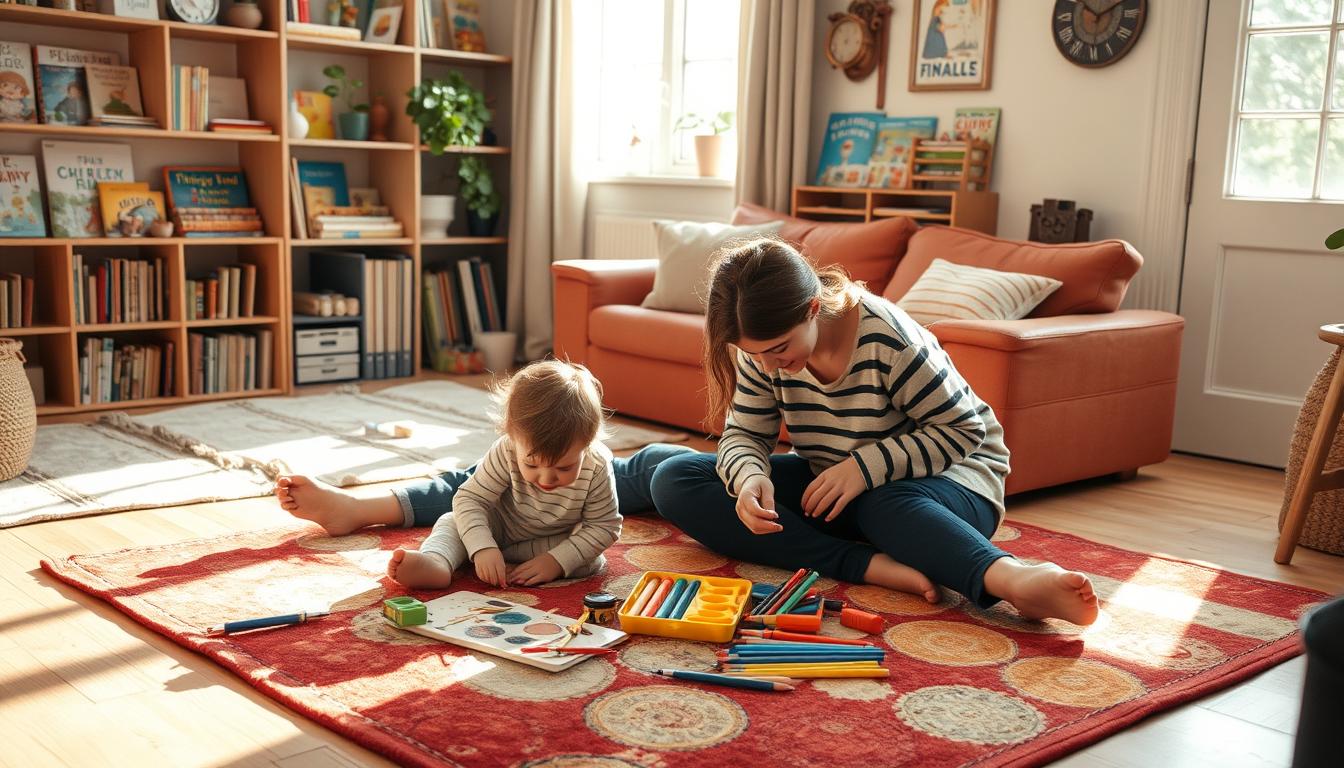Ever thought about getting the most out of working with your child’s therapist? Building a strong partnership with their mental health expert is vital for their well-being. Start by being open about your child’s background and what you hope to achieve in therapy. Sharing school reports and other important details can help the therapist do their best.
Make sure to discuss things like billing and how long it takes to get back to you early on. This avoids confusion later. Setting realistic goals and understanding that progress can take time is important. It’s also key to involve the whole family in therapy and to follow up at home.
Going to sessions with your child and talking with the therapist can really help. It’s okay to ask for a second opinion if you think it could help your child. Always remember, your input as a parent is valuable.
Key Takeaways
- Effective communication between parents and therapists is key to successful treatment outcomes.
- Parents play a critical role in reinforcing therapy skills at home.
- Regular check-ins provide a comprehensive view of the child’s progress.
- Clarifying logistics upfront avoids misunderstandings later on.
- Seek a second opinion if necessary for your child’s therapeutic journey.
Understanding the Role of a Child Therapist
A child therapist does many things to help kids and their families. They use methods like cognitive behavioral therapy (CBT) and dialectical behavioral therapy (DBT). These help kids deal with their problems.
Therapists work with parents to understand their child’s mental state. This is especially true in online family therapy. Dr. Jocelyn R. Lebow says it’s key for parents to know the treatment plan.
Play therapy is great for kids aged 2 to 9. It lets them express feelings and learn to solve problems. Since many kids have ADHD or anxiety, knowing about these methods is important.

Teenagers need privacy in therapy. Parents should show interest but not pry. Therapy for teens works best when they feel their feelings are respected.
Therapy isn’t just about quick fixes. It’s about building resilience and skills. Parents can get updates and share concerns during sessions. This helps the therapy work better.
Child therapists are key in working with parents. A 2008 survey showed this need. Good communication between parents and therapists leads to better results. It helps everyone understand the goals and see progress.
Setting Clear Expectations with Your Child’s Therapist
It’s key to set clear expectations with your child’s therapist for a good therapy journey. Talk about the therapy methods, how long it will take, and what you hope to achieve. For kids with ADHD, anxiety, and other issues, setting goals 3-5 years behind their peers can help. This way, you avoid setting goals that are too high and might lead to disappointment.

When setting goals, remember the therapist’s role and your own as a parent. Talk about the treatment plan, how you’ll measure success, and the time it will take. Make sure you both know what to expect and how to communicate well. For example, therapies like cognitive behavior therapy can show results in a certain time frame. Knowing this can help you set realistic goals.
Using gentle parenting can also help. Focus on your child’s growth, not how others see you as a parent. Being flexible and kind while setting clear rules makes your child feel safe. This helps all children feel they get the right amount of attention and support, reducing middle child syndrome.
Teaching kids about consent is also crucial. It helps them understand and respect boundaries, both in therapy and everyday life. Clear, consistent communication and accountability, maybe with coaching help, are key to teaching consent.
Parent Involvement: Your Role in the Therapeutic Process
Being involved in your child’s therapy is key. It helps them grow and creates a caring home environment. This is good for their overall health.
The Importance of Consistent Attendance
Going to therapy sessions regularly is crucial. Missing appointments can slow down progress. This is especially true for kids dealing with sibling rivalry or family changes.
A study in Behavior Therapy (1992) shows that regular sessions help with phobias. This idea applies to other therapies too.

A study in the American Journal of Orthopsychiatry (1994) found reasons why kids might stop going to therapy. Regular visits help avoid these problems. This makes recovery easier for your child.
How to Reinforce Therapy at Home
Your home is important for keeping therapy going. Using eco-friendly parenting can make a caring space for your child. Activities like art, music, or writing help release emotions.
Having a routine for meals, homework, and bedtime helps too. It makes your child feel safe and secure. This helps therapy fit smoothly into their life.
Parent Management Training
Parent management training teaches you how to handle your child’s behavior. It helps with sibling rivalry and other family issues. A study in the Journal of Clinical Child & Adolescent Psychology (2013) shows it improves your child’s behavior and mental health.
Research from the Journal of Child and Family Studies (2012) also supports this. It says involving parents in therapy leads to better results. This makes sure your child gets support everywhere they go.
By focusing on these areas, you build a strong support system. This can greatly improve your child’s mental health and well-being.
Effective Communication with Your Child’s Therapist
Talking openly with your child’s therapist is key to their progress. You should share any observations or concerns. This helps the therapist understand your child better. Since 1 in 5 kids face mental health issues like anxiety or depression, your input is vital.
What to Share with the Therapist
When discussing puberty with your child, tell the therapist about any mood changes. Also, share how your child interacts with social media. If a family member is dealing with postpartum mental health, let the therapist know. This can help them understand your child’s situation better.
Remember to mention any specific events or triggers that might affect your child. This information is important for the therapist to create a comprehensive plan.
Questions to Ask the Therapist
It’s important to ask the therapist questions to build a strong relationship. Ask about your child’s goals and how you can help at home. Find out how often you should update the therapist on your child’s progress.
Ask about signs of progress or setbacks. This way, you can recognize and meet your child’s changing needs. Understanding the therapist’s methods, like family therapy, helps you support your child better. This dialogue is good for your child and strengthens the treatment team.
FAQ
How can I effectively work with my child’s therapist to support their mental health?
What is the role of a child therapist?
Why is it important to have clear expectations with my child’s therapist?
How can parents be involved in the therapeutic process?
Why is consistent attendance at therapy sessions important?
How can I reinforce therapy at home?
What is parent management training?
What should I share with my child’s therapist?
What questions should I ask my child’s therapist?
This post contains affiliate links. If you click on a link and make a purchase, I may earn a small commission — at no extra cost to you. Thank you for supporting this blog and helping me keep the patterns free! Read the full Affiliate Disclosure & Transparency.
